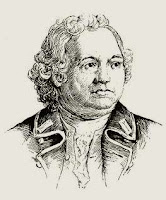For the last two days I’ve quoted advertisements from
Connecticut newspapers spelling out a dispute between
militia colonel
William Williams of Wilmington,
Vermont, and the former minister
Samuel Ely. That wasn’t the last dispute that Ely got into.
In April 1782, while living in Conway, Massachusetts, Ely led a crowd that kept the Hampshire County court closed, just as similar crowds had done in 1774 and throughout the war. Though
Massachusetts had a new constitution, Ely and the scores of men who supported him didn’t think the system was fair to poor farmers. Ely is described as picking up a stick and shouting, “Come on, my brave boys, we’ll go to the woodpiles and get clubs enough to knock their grey
wigs off!” State authorities arrested Ely, but a crowd of over a hundred men broke him out of the
Northampton jail.
Ely returned to Wilmington, Vermont, for refuge, only to find the same issues in that little nation. By the end of the year Ely was convicted for saying, “The state of Vermont is a damned state, and the act for the purpose of raising ten shillings upon every hundred acres of land is a cursed act, and they that made it are a cursed body of men.” Vermont officials happily gave Ely back to Massachusetts, which locked him up for a while.
After winning his release, Ely seems to have laid low, or perhaps he just got lost in the crowds of the
Shays’ Rebellion. But he resurfaced in
Maine in 1790, and was soon leading a settlers’ campaign against big landowner
Henry Knox. While hiding from legal authorities he managed to publish pamphlets with titles like
The Unmasked Nabob of Hancock County; or, The Scales Dropt from the Eyes of the People and
The Deformity of a Hideous Monster, Discovered in the Province of Maine, by a Man in the Woods, Looking after Liberty. Ely finally died in the late 1790s.
In short, Samuel Ely was a radical organizer, constantly fighting against economic inequality according to his interpretation of Christian scripture. He wasn’t the sort of Revolutionary whom America’s wealthy liked to remember.
In
Travels in New-York and New-England,
Timothy Dwight (1752-1817, shown above) called Ely “the great fomenter of discontent, confusion, and sedition, in Massachusetts,” and wrote, “The remainder of his life was a tissue, woven of nothing but guilt and infamy.” Dwight had the most to say about Ely’s early work as a minister in Somers,
Connecticut:
Ely was an unlicensed and disorderly preacher, and could not obtain an ordination. His character even at that time, although less known and probably less corrupted than it was afterwards, was yet so stained, as to render it impossible for him to enter the ministry. But he possessed the spirit, and so far as his slender abilities would permit the arts, of a demagogue in an unusual degree. He was voluble, vehement in address, bold, persevering, active, brazen-faced in wickedness, and under the accusation and proof of his crimes would still wear a face of serenity, and make strong professions of piety. At the same time he declared himself, everywhere, the friend of the suffering and oppressed, and the champion of violated rights. Wherever he went, he industriously awakened the jealousy of the humble and ignorant against all men of superior reputation, as haughty, insolent, and oppressive. Jealousy he knew to be, among human passions, the most easily and certainly kindled. Both his character and his circumstances were in his own view deplorable; and he felt therefore, that he had nothing to lose beside his neck; a loss too uncommon, in this state, to be seriously dreaded, except in the case of murder. Of course, he undauntedly applied himself to any wickedness, which promised him either consequence or bread.
In fact, Ely was qualified to preach as a graduate of
Yale,
the same college where Dwight was president for twenty-two years. Dwight was an arch-conservative of early America, so of course he hated Ely’s preaching against the upper class. Despite the omissions and obvious political leaning of Dwight’s statement, later authors repeated his judgment on Ely.
In 1858 Benjamin H. Hall’s
History of Eastern Vermont described Samuel Ely’s military career this way:
A bold, but rash and impetuous man, he had served in the battle of Bennington as a volunteer, and being connected with no company or regiment had fought without the advice or direction of any person. He had been court-martialed after the action on account of his singular conduct in retaining a large amount of valuable plunder, but had been honorably discharged on proof that he had taken only such articles as he had won in his own independent method of warfare.
That account said nothing about Ely commanding of the Wilmington militiamen after their colonel had left, as three of them later wrote. Instead, it painted Ely as unable to get along with any group, and getting away with looting on that account. (Hall had only good things to say about Ely’s accuser William Williams, though he had to note that Williams had ended up moving to
Canada.)
Another Yale-connected author actually concealed some favorable information about Ely. In
Yale and Her Honor-roll in the American Revolution, 1775-1783 (1888), Henry P. Johnston quoted the 1778 advertisements from Ely’s supporters in Vermont, but incompletely. He left out the part about Ely leading the Wilmington militia and the Vermont men’s denunciations of Williams for plundering himself. Johnston did state: “After the war Mr. Ely agitated socialistic views, got into trouble, defied the authorities in Massachusetts, was denounced as a ‘mobber,’ and arrested.”
It wasn’t until the Depression that historians began to recognize Samuel Ely as a political leader, albeit an unsuccessful one. In 1932 the
New England Quarterly published an article by Robert E. Moody titled “Samuel Ely: Forerunner of Shays.” In 1986 the
Maine Historical Society Quarterly published Alan Taylor’s “The Disciples of Samuel Ely: Settler Resistance against Henry Knox on the Waldo Patent, 1785-1801.” And now the
new Massachusetts Historical Review offers Shelby M. Balik’s “‘Persecuted in the Bowels of a Free Republic’: Samuel Ely and the Agrarian Theology of Justice, 1768-1797.”















